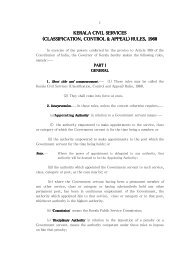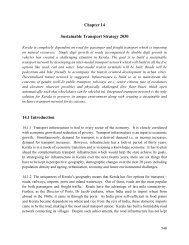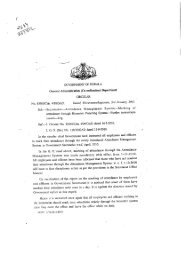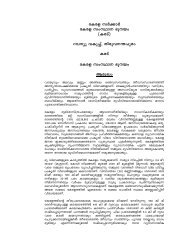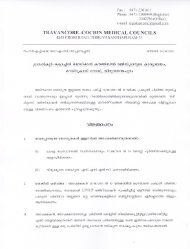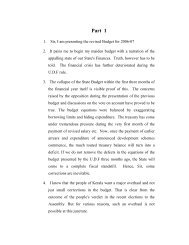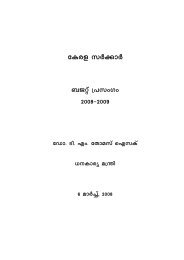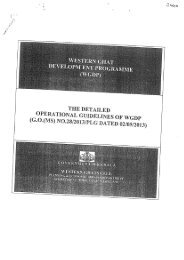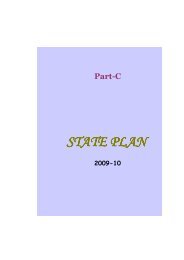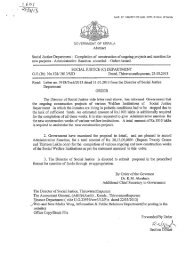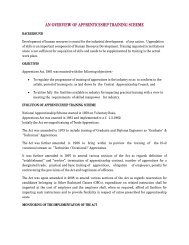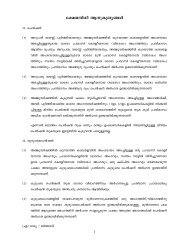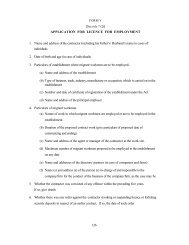You also want an ePaper? Increase the reach of your titles
YUMPU automatically turns print PDFs into web optimized ePapers that Google loves.
KIRAN RAM & BINU B<br />
10 KERALA CALLING <strong>November</strong> <strong>2012</strong><br />
10 KERALA CALLING<br />
COVERSTORY<br />
The President of<br />
India, Mr. Pranab<br />
Mukherjee<br />
inaugurated the<br />
Viswa Malayala<br />
Mahotsavam on the<br />
30th of October<br />
<strong>2012</strong>. The event<br />
concluded on 1st<br />
<strong>November</strong>, the day<br />
Kerala state was<br />
born and celebrated<br />
as Malayalam day.<br />
Celebrating<br />
The Viswa Malayala Mahotsavam was<br />
literally a celebration of Malayalam in all its<br />
aspects. The three day event, inaugurated by<br />
none other than the President of India, Mr.<br />
Pranab Mukherjee on the 30th of October<br />
<strong>2012</strong>, concluded on 1st <strong>November</strong>, the day<br />
Kerala state was born and celebrated as<br />
Malayalam day. The much awaited<br />
Malayalam University also came into being<br />
on 1st <strong>November</strong> at Thunchan Paramb with<br />
a host of promises and projects for the<br />
Malayalam language.<br />
Participated by littérateurs of Malayalam
Malayalam<br />
and other languages from within the country and abroad like<br />
the Booker Prize Winner Ben Okri, veteran Tamil poets<br />
I. Parthasarathy, Sirpi Balasubrahmaiam, Bengali writer Sharmila<br />
Ray, veteran journalist and writer Anita Nair, Malayalam literature<br />
veterans such as Jnanpith laureates ONV Kurup, M T Vasudevan<br />
Nair, film maker Adoor Gopalakrishnan, noted critic Zachariah,<br />
T Padmanabhan, Sugathakumari, Dr. Puthussery<br />
Ramachandran, Sethu, Benyamin, noted playwright Kavalam<br />
Narayan Panikkar etc. drew the attention of the literary world<br />
of Malayalam.<br />
Eminent literary, art and cultural personalities who made<br />
great contributions to Malyalam such as ONV Kurup, M T<br />
Vasudevan Nair, T Padmanabhan, Sugathakumari,<br />
Dr. Puthussery Ramachandran, Adoor Gopalakrishnan,<br />
Kavalam Narayana Panicker and P Govinda Pillai were<br />
honoured in the function named ‘Aadhara Sandhya.’<br />
The discussions, seminars, open forums with Indian as<br />
well as foreign writers, cultural programmes and book<br />
exhibitions could bring in focus to the event and its feedback,<br />
revealing the ideas behind their writings, their ideologies etc.<br />
Opinion of the participants including the common man could<br />
be elicited at the end of the Mahotsavam.<br />
Preparations were on days before announcing the<br />
Mahotsavam. The Vilambara Sandhya and Kelikottu could<br />
convey the message of the Mahotsavam and the importance<br />
of Malayalam.<br />
An elaborate working committee functioned actively<br />
in which Minister for Cultural K C Joseph was the Chairman,<br />
Palod Ravi MLA, the Vice Chairman and Kerala Sahitya Academy<br />
President Perumbadavam Sreedharan was the Working<br />
Chairman. The event, which was jointly oraganised by the<br />
Department of Culture and Kerala Sahitya Academy, could<br />
make a hallmark in the history of Malayalam.<br />
<strong>November</strong> <strong>2012</strong> KERALA CALLING<br />
11
Indira Parthasarathy<br />
Tamil Writer<br />
“How do you decide the criteria for<br />
giving classical status to a language?<br />
Sanskrit or Latin or Greek have not been<br />
given this status by any organisation. If<br />
the status has to be given at all, why<br />
does not Malayalam qualify? asked<br />
Indira Parthasarathy, veteran Tamil writer<br />
to have won both the Sangeeth Natak<br />
and Sahitya Academy Award. When the Sahitya Akademi said<br />
that 1,000 years of continuous existence would be deemed as<br />
a criteria, Tamilians were unhappy. Malayalam, Tamil, Telugu<br />
and Kannada are all part of Dravidian language added the<br />
writer.<br />
Sharmila Ray<br />
Bengali writer<br />
“Kerala is like a poem for me” said poet Sharmila Ray, who<br />
is also an associate professor and head of the Department of<br />
History at City College, Kolkata. She spoke on the import of<br />
12 KERALA CALLING <strong>November</strong> <strong>2012</strong><br />
COVERSTORY<br />
Malayalam should have classical<br />
language status’: Indian Writers<br />
gender on poetic language and said<br />
she saw herself as a writer and much<br />
less as a woman writer. “Writing is my<br />
response to the outer world. For me,<br />
smell and colour and music and such<br />
elements make up a huge painting.<br />
Words are one tool that I pick to express<br />
this image in my mind. I believe if I take<br />
out the ‘she’ who is the narrator in my<br />
poems, they might as well be about<br />
anyone else,” she said.<br />
To a reply about her medium of language she said, “I was<br />
born and brought up in an English speaking atmosphere.<br />
When grew up, I embraced Bengali books and selected my<br />
medium of writing as Bengali. Now I used to write all my works,<br />
except poetry in Bengali. I didn’t have enough Bengali words<br />
to express poetry.” Sharmila said.<br />
Anita Nair<br />
Indo- Anglian Malayali Writer<br />
English is capable of reflecting local culture, said Indo-
Anglian Malayali writer Anita Nair.<br />
The life portrayed in her novels has<br />
reflected the rural life in Palakkad. She<br />
was answering a in the open forum.<br />
No language in the world has been<br />
colonized... It is the attitude that<br />
decides the future of a language. It is<br />
the theme that is more important. The<br />
language is only a medium to convey<br />
the ideas. English overcomes mother<br />
tongue only when we allow it. We<br />
should take our mother tongue<br />
home. Let the children learn it deeply through reading and<br />
writing. Let it develop through them. Malayalam has influenced<br />
her very much. The metaphors in Malayalam have attracted<br />
her. Malayali writers have touched different aspects of life; she<br />
pointed out these a unique nature.<br />
The language used in sending SMS and e-mail should not<br />
be taken as real language. it is necessary only to convey<br />
messages and if it is to be come the language it is terrible she<br />
added.<br />
Dr. Sirpi Balasubramaniam<br />
Tamil Writer<br />
Dr. Sirpi Balasubramaniam,<br />
eminent Tamil writer and the founder<br />
member of Vanambadi Literary<br />
Movement has declared that<br />
Malayalam have writings old enough<br />
to grant classical status. Getting<br />
classical status to Malayalam is the<br />
wish of every Tamilian, he added.<br />
Poems find it difficult to get sold<br />
nowadays. But Kerala is different<br />
were we could see poetry books in<br />
book shops... Lyrics of cinema are being mistaken as poetry<br />
by the new generation. These lyrics live only up to three months<br />
he said. Born with laptops on lap, the new generation is like<br />
fishes taken from ponds to new pots. They think that this is the<br />
best place. They live like slaves of a foreign culture, dreaming<br />
of placements in global market... Being separated from the<br />
culture and relationships they lose the energy of youth. Later<br />
he recited his own poem written about a Belgium mirror. The<br />
poem which describes mothers affection and respect towards<br />
father filled the audience with emotion.<br />
Dr. Sidhalinga pattanshetty &<br />
Dr. Hema Pattanshetty<br />
Kannada writers<br />
The presence of eminent Kannada writer and Hindi<br />
professor Dr. Sidhalinga pattanshetty and his wife Dr. Hema<br />
Pattanshetty, a<br />
Psycology<br />
professor was an<br />
attraction of the<br />
Malayalam<br />
Maholsavam.<br />
English cannot<br />
reflect the local<br />
culture said Dr.<br />
Sidhalinga<br />
pattanshetty.<br />
Translations do<br />
not carry the real soul of writings, it cannot be a true copy, but<br />
it is only a second version. When a poet writes a poem, he<br />
simply lays the foundation. The rest is built by the readers, he<br />
said. The readers take a poem in different aspects. That is why<br />
even if the poet dies the poems remain eternal said the writer<br />
of more than one hundred works.<br />
Dr. Hema pattanshetty writer of 27 books recited two of her<br />
poems Confidence and Determination from kannada and its<br />
translations in English. Later she also joined with other writers<br />
in the open forum.<br />
<strong>November</strong> <strong>2012</strong><br />
13<br />
KERALA CALLING
D. Babu Paul<br />
We should take pride and love<br />
towards our language instead of doing<br />
blind imitation while taking words from<br />
other languages, said Dr. D. Babu Paul,<br />
former Addl. Chief Secretary. He was<br />
inaugurating the seminar on ‘Malyalam<br />
Language Day Celebration’. Malayalam<br />
language has its own<br />
identity. Hence there is<br />
no need to find exact<br />
Malayalam words<br />
always while translating.<br />
We should develop the<br />
skill to use our language<br />
beautifully and free of<br />
errors and develop a pride towards it.<br />
Kavalam Narayana Panicker<br />
No talk about drama is possible<br />
without taking our heritage into account,<br />
said noted dramatist, Kavalam Narayana<br />
Panicker while speaking at the seminar<br />
on Drama held in association with Viswa<br />
Malayala Mahotsavam. We are usually<br />
claiming 100 years’ of tradition to<br />
Malayalam drama. But the old heritage<br />
forms like Theyyam, Mudiyettu etc. have<br />
symbols of drama.<br />
Hence we can say that<br />
Mayalayam drama<br />
evolved with<br />
Malayalam. Kerala is in<br />
need of a specific<br />
dramatic theatre which<br />
gives prominence to body language and<br />
gestures.<br />
Dr. M R Thampan<br />
Malayalam language should be<br />
equiped in tune with the development<br />
in the field of Science and Technology,<br />
said Dr. M R Thampan, Director, Kerala<br />
Bhasha Institute. He was speaking at the<br />
14<br />
KERALA CALLING <strong>November</strong> <strong>2012</strong><br />
COVERSTORY<br />
Seminars<br />
seminar on ‘Language Computing’. The<br />
development of<br />
language should not<br />
affect its beauty and<br />
purity. In case of the<br />
developed language,<br />
there is a permanent<br />
method for revival.<br />
Unfortunately, our<br />
language does not have any such<br />
methods.<br />
Achyut Sankar<br />
It is the attitude, not the problems<br />
related with technicality that determines<br />
the future of Malayalam language, said<br />
Achyut Sankar, Head, Bio Informatics,<br />
Kerala University by presenting a paper<br />
on ‘Malayalam -<br />
yesterday, today and<br />
tomorrow’. Malayalam is<br />
beyond all our<br />
indifferences... There is<br />
a need of unity for the<br />
development of<br />
Malayalam language. Malyali’s second<br />
choice is Sanskrit after English... There is<br />
a wrong tendency of comparing<br />
Malayalam with English and this should<br />
be avoided, he said.<br />
ONV Kurup<br />
The language pride of Malayali is far<br />
behind when compared to other<br />
language speaking people, said Jnanpith<br />
laureate ONV Kurup. He was speaking at
the seminar ‘Malyalathinte<br />
Kavithakalangal’. Our language has to be<br />
cleansed like we are cleaning our dress<br />
and environment. Malayalam is eligible<br />
for classical status. But status is not the<br />
only thing that matters.<br />
Those with vested interests are<br />
hindering the process of making<br />
Malayalam as the first language, There is<br />
a decaying fallacy among the Malayalees<br />
against making ours as the first language.<br />
Our people have no pride for our<br />
language – ONV said.<br />
Zachariah<br />
Writers should not cheat their readers,<br />
said noted critic<br />
Zachairah. He was<br />
speaking at the session<br />
on ‘Chemisty of Story<br />
telling.’ It is the duty of<br />
the writer to strengthen<br />
not only his readers but<br />
also the society. He should also<br />
strengthen the values of democracy,<br />
humanity, secularism, and humaneness.<br />
The duty of a literateur is extremely<br />
different from his tradition. They should<br />
build a chemistry related to humaneness<br />
rather than creating hate and hatred –<br />
Zachariah said.<br />
Adoor Gopalakrishnan<br />
New generation<br />
films are spoiling<br />
Malayalam language by<br />
giving prominence to<br />
female villian roles who<br />
are mouthing abusive<br />
words. The young<br />
generations are getting<br />
excited by hearing these words. Time is<br />
not farther when female villians roles will<br />
be the dominant presence of Malayalam<br />
cinema. He was inaugurating the Seminar<br />
on ‘We, our Cinema’conducted as part<br />
of Viswa Malayala Mahotsavam.<br />
There is a trend that Malayalam films<br />
will be like Tamil or Hindi. Media is also<br />
encouraging this added Adoor.<br />
<strong>November</strong> <strong>2012</strong><br />
15<br />
KERALA CALLING
It is not English,<br />
But people<br />
Killing Regional Languages<br />
16 KERALA CALLING <strong>November</strong> <strong>2012</strong><br />
COVERSTORY<br />
People had<br />
misconceptions<br />
about Africa. There<br />
was famine and<br />
distress but there<br />
was also humour,<br />
family, happiness,<br />
richness of culture,<br />
and literature and<br />
there are the<br />
beautiful things<br />
that are not being<br />
talked about.<br />
“English is not killing regional languages,<br />
but we the people are” said Booker Prizewinner<br />
and Nigerian writer Ben Okri. He was<br />
speaking in an interactive session in<br />
connection with the Viswa Malayala<br />
Mahotsavam. We need to keep our languages<br />
alive by helping them evolve constantly.<br />
Teach our children to be tri- or bi-lingual<br />
.We have to accept the history that has<br />
happened to us and adapt to new ways<br />
to keep our languages alive,” said Okri. It<br />
was Union Minister of State for Human<br />
Resource Development Shashi Tharoor,<br />
who, through a set of well-prepared<br />
questions led the session. At the<br />
beginning of the session the Union<br />
Minister gave a concise account of Okri’s<br />
cosmopolitan background.<br />
The Minister requested the author to<br />
talk about the story-telling tradition he<br />
bequeathed from his mother and how it<br />
influenced his writing. “The stories that<br />
my mother would tell me were so<br />
fascinating that they forced me to<br />
contemplate not just on the story but also<br />
on the point she was making. At the age<br />
of 13 or 14, I had a beautiful girl friend<br />
and I was writing poems about her. One<br />
of my friends suggested that I should try<br />
writing on other things as well. And that<br />
was the point when I discovered that<br />
poetry is not just for expressing big<br />
emotions. One of the things I<br />
started to write on was<br />
‘injustice’. Later, around 1992-<br />
93, I became aware of the<br />
inability of the language of<br />
the colonialists to evoke the<br />
African reality. It will work<br />
in a western setting, but<br />
an African or Indian<br />
setting needed a new<br />
kind of language”<br />
replied Okri.<br />
To another<br />
question as to why<br />
many local writers did
“As a writer you<br />
cannot repeat<br />
anything. If you<br />
can’t go forward,<br />
you can go round,<br />
spiral or go<br />
sideways. The<br />
human eyes and<br />
brain are made in<br />
such a way that<br />
reality constantly<br />
eludes them.<br />
Storytelling can<br />
fortify reality,”<br />
not have an international recognition<br />
despite their well-written books, Okri said<br />
“Writers in places like Africa and India<br />
need to come up with creativity in their<br />
contribution to make their presence felt<br />
around the world.. “Exile is important for<br />
literature. Literature can only come into<br />
existence in a condition where words<br />
are in exile from reality,” while elaborating<br />
on his own perpetual state of exile as an<br />
African writer living and writing in<br />
London.<br />
According to him, he belonged to the<br />
category of writers who ‘tries to bring out<br />
the vision in the text,’ as opposed to those<br />
who impose their thoughts on the texts<br />
and the world. “In the ‘spirit child’ of ‘The<br />
Famished Road’, I found a powerful<br />
metaphor to express African reality. It was<br />
half-human, half-dream and represented<br />
ideas that fascinated me - cyclicity,<br />
reincarnation! It is difficult to use the<br />
language of colonialists to convey the<br />
African emotions and spirit. Hence, one<br />
had to create a unique style, which was<br />
simple, yet deceptive, and could convey<br />
the different dimensions of African life,”<br />
said Okri.<br />
He added that people had<br />
misconceptions about Africa. There was<br />
famine and distress but there was also<br />
humour, family, happiness, richness of<br />
culture, and literature and there are the<br />
beautiful things that were not being<br />
talked about. Calling Kerala his second<br />
home, Mr. Okri engaged the audience<br />
through his eloquent conversation. He<br />
often came up with profound<br />
observations and impromptu theories.<br />
“As a writer you cannot repeat anything.<br />
If you can’t go forward, you can go round,<br />
spiral or sideways,” he commented. “The<br />
human eyes and brain are made in such<br />
a way that reality constantly eludes them.<br />
Storytelling can fortify reality,” he said.<br />
In between, he read from his poem<br />
‘My Mother Sleeps’ and from some of his<br />
essays which were seeped in aphorisms.<br />
Before ending the session, he read a<br />
poem on his father after explaining that<br />
“as an African, I believe in balance.”<br />
<strong>November</strong> <strong>2012</strong><br />
17<br />
KERALA CALLING



